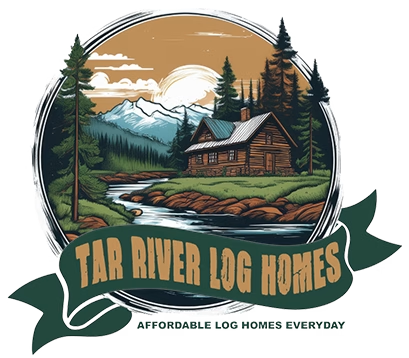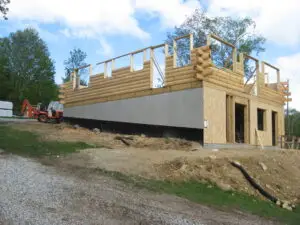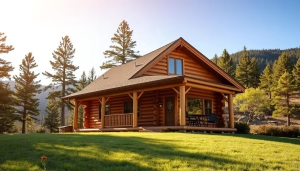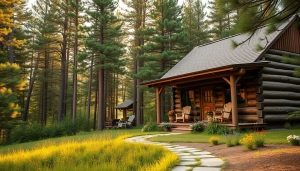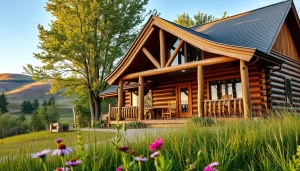If you’ve ever dreamed of owning a cozy cabin without overspending, affordable log cabin kits make that goal possible. The kits provide pre-cut materials, easy assembly plans, and reliable quality—without high markups or confusing extras that inflate costs.
At Tar River Log Homes, we focus on practical, affordable log cabin kits, transparent pricing to help families build with confidence. Our affordable kits combine premium Eastern White Pine logs with clear instructions designed for both DIY enthusiasts and contractors.
This guide explores what makes these kits affordable and what to expect from your materials. Keep reading and also learn how to choose the right design for lasting comfort and value.
What Are Affordable Log Cabin Kits?
Affordable log cabin kits offer a straightforward way to build your own log home without overspending. They provide pre-cut materials and plans that help keep costs manageable while giving you control over the build.
These kits vary in design, price, and complexity, making it easier for you to find one that fits your budget and skills.
Definition and Overview
Affordable log cabin kits are sets of pre-measured, cut, and prepared materials used to build a log home. They come with detailed plans and instructions, reducing the need for custom engineering or ordering materials piecemeal.
The goal is to give you everything necessary to construct your cabin efficiently. You can expect high-quality wood like kiln-dried Eastern White Pine, shipped directly to your site.
This lowers costs by cutting out middlemen and showroom expenses, a method trusted suppliers use to deliver great value. With these kits, you can either do the work yourself or hire local builders, making it flexible for different types of buyers and skill levels.
Benefits of Choosing an Affordable Kit
Choosing an affordable log home kit saves you money without compromising quality. You receive wholesale prices and materials designed for ease of assembly. This cuts down on waste and unnecessary expenses found in traditional builds.
You get to pick from various floor plans and styles, allowing customization while sticking to your budget.
Transparent pricing means no hidden fees or surprise costs throughout the process. Because materials come pre-cut and packaged, building typically goes faster, lowering labor costs if you use contractors. Plus, many kits include a clear step-by-step process, helping you stay organized.
Why Pre-Cut Kits Reduce Building Waste and Costs
According to the U.S. Department of Energy, pre-cut construction kits help minimize material waste and improve overall energy efficiency because logs are processed with precision before delivery.
This method reduces on-site cutting and disposal needs, keeping projects cleaner and cheaper. The DOE notes that optimizing building materials can cut waste by up to 50%, helping homeowners save money while protecting the environment.
Types of Log Cabin Kits
Log cabin kits come in several types based on size and complexity:
- Shell Kits: Include all exterior logs and materials but exclude roofing, interior finishes, and utilities. Good for tight budgets and phased building.
- Complete Kits: Offer everything needed for full assembly, including interior walls, roofing, windows, and doors. These kits are ready for quick setup.
- Custom Kits: Allow you to tailor floor plans, log styles, and finishes. You might pay more, but this lets you control design details.
- DIY Kits: Designed for owners who want an active role in building. They come with instructions and materials suited to beginners and experienced builders alike.
Each type balances cost and convenience differently, so choosing one depends on your skills, timeline, and how much help you want managing the build.
Explore options structured around your needs for a practical, affordable log home.
Key Components and Materials
Building a log cabin starts with quality materials and clear expectations about what’s included. You’ll want to know what comes in your kit, the types of logs available, and how your cabin stays insulated and weatherproofed to keep comfort and durability high.
Standard Inclusions in Log Home Packages
Most log home packages include the essential structural components needed for your cabin’s frame. This typically means pre-cut logs for walls, roof trusses, floor joists, and decking. Doors, windows, fasteners, and sealing materials often come as part of the kit.
What’s usually not included are electrical wiring, plumbing supplies, insulation, and interior finishes. These are items you or a contractor will handle separately. Each package is designed to give you a solid starting point with high-quality logs and materials to build around.
Log Profiles and Wood Types
The log profile affects both style and performance. Standard log profiles include round, square, and D-shaped, each providing different aesthetics and construction fits. D-shaped logs, for example, offer a flat interior surface that can simplify finishing work inside your home.
Wood type also matters for strength, insulation, and durability. Eastern White Pine log benefits make this species popular for its ease of handling and good insulation properties.
Kiln-dried logs reduce moisture content, limiting shrinkage and settling after construction. Choosing the right profile and wood ensures your cabin meets your needs for both looks and long-term stability.
Insulation and Weatherproofing
Your log cabin’s ability to stay warm in winter and cool in summer depends largely on insulation and sealing methods. While logs themselves have natural insulating qualities, additional insulation is necessary, especially in colder climates.
Weatherproofing includes sealing gaps between logs with specialized chinking or caulking materials that prevent drafts and water infiltration. It’s important that these materials remain flexible to accommodate log movement over time.
Roof insulation and energy-efficient windows also play critical roles. Proper insulation and weatherproofing together help keep your home comfortable and reduce energy costs year-round.
How to Choose the Right Affordable Log Cabin Kit
Selecting an affordable log cabin kit means balancing size, features, and manufacturer quality. You want a design that fits your space needs without stretching your budget. At the same time, the builder’s reputation and materials can make or break your investment.
Evaluating Floor Plans and Sizes
Start with how much space you really need. Kits come in various sizes— from tiny studios to multi-bedroom models. Think about your lifestyle: Will you use the cabin year-round or just seasonally? Smaller floor plans reduce material costs and simplify construction.
Look for well-designed layouts that maximize usable space. Open floor plans often save square footage while giving a roomy feel. Consider future needs, such as extra bedrooms or workspaces.
Reputable companies offer flexible plans that prioritize efficient, practical designs suitable for most budgets. Pay attention to ceiling heights, porch options, and potential for expansion when choosing your floor plan.
Customizing Features to Fit Your Budget
You can customize many kits to match your budget without sacrificing quality. Prioritize essentials first, like solid insulation, quality lumber, and sturdy roofs. Extras such as custom windows, stone fireplaces, or complex roofing increase costs quickly.
Be realistic about DIY work versus professional help. Simple kits with clear instructions cut labor expenses. Straightforward customization keeps your price fair while letting you control finishes and layouts.
Create a list separating “must-haves” from “nice-to-haves.” Focus your spending on features that improve comfort and longevity. Avoid add-ons that inflate the price but don’t add lasting value.
Comparing Log Home Manufacturers
Not all log home manufacturers provide the same level of quality or service. Look for companies that guarantee materials on their log home kits, provide clear pricing, and have transparent processes. Avoid those with hidden fees or high-pressure sales tactics.
Top suppliers stand out by offering wholesale prices and premium Eastern White Pine logs shipped directly to you. Some offer a price guarantee of up to 105%, ensuring you get the best deal without gimmicks.
Check the manufacturer’s experience and customer reviews to confirm timely deliveries and reliable support. A good manufacturer will make building easier, not harder, by offering detail-oriented kits and straightforward instructions.
Popular and Reputable Manufacturers
Choosing a log home manufacturer means focusing on quality materials, clear guarantees, and reliable customer support. You want a company that offers straightforward pricing and dependable delivery so your project stays on track and on budget.
Top Manufacturers in the U.S.
Some of the most trusted U.S. log home manufacturers specialize in providing precision-cut, kiln-dried logs sourced from strong, durable timber. These companies offer a range of customizable kits that fit anywhere from small cabins to full-sized homes.
Some suppliers offer wholesale prices directly to you, with no inflated markups or flashy showrooms. You’ll find options that balance quality with affordability, making it easier to build your dream log home on a budget.
Manufacturer Guarantees and Warranties
A solid warranty protects your investment from unforeseen defects. Leading manufacturers typically cover structural integrity for decades, including log quality and craftsmanship. You should look for guarantees on the kiln-drying process and resistance to settling or warping.
Some companies back their kits with a 105% price guarantee—meaning if you find a better price elsewhere, they not only match it but beat it. Besides pricing, expect transparent terms without confusing clauses, so you know exactly what the warranty covers before you commit.
Customer Support and Delivery Options
Reliable customer support means having access to knowledgeable staff who guide you through the building process, from selecting plans to final assembly. Many providers assign a dedicated project specialist to answer questions and ensure you understand each step clearly.
Delivery often includes detailed construction plans and pre-packaged materials to simplify on-site work. Some manufacturers offer shipping to all 50 states, with options to coordinate logistics or provide financing. Look for companies that make communication easy and avoid last-minute surprises, helping you build progress smoothly.
Cost Factors and Pricing
Understanding log cabin kit pricing and costs can save you from unexpected expenses. Key elements like size, materials, labor, and additional services all factor into the final cost. There are different options depending on whether you prefer a DIY build or a fully finished home.
Price Ranges and What Influences Cost
Log cabin kits commonly range from \$50 to \$100 per square foot for materials alone. For example, a 500-square-foot cabin kit typically costs between $25,000 and $50,000. Larger or more complex designs increase material and labor needs, driving up costs.
Factors affecting pricing include:
- Size of the cabin: More square footage means more logs and supplies.
- Material quality: Kiln-dried Eastern White Pine logs tend to be pricier but more durable.
- Customization: Adding features like porches or large windows adds cost.
- Site preparation: Excavation and foundation work can add thousands.
Turnkey log home kits, which include installation, utilities, and finishing, range from $125 to $275 per square foot.
How to Find Discounts and Wholesale Deals
Looking for the best price means cutting out middlemen. Buying your log cabin materials directly from a trusted company ensures wholesale pricing without markup layers.
Consider these strategies:
- Buy standard log home packages that bundle materials.
- Ask about volume discounts if you plan multiple buildings.
- Avoid flashy sales gimmicks and focus on transparent pricing.
- Timing your purchase during off-season periods can sometimes lower costs but expect steady pricing year-round with reputable suppliers.
Being upfront about your budget helps avoid surprises later.
Financing and Turnkey Estimates
If you want a hassle-free build, turnkey log cabin kits include labor, permits, utility hookups, and finishes. These all-in-one packages tend to cost between $125 and $275 per square foot. The wide range depends on location, labor rates, and included features.
Financing options may be limited compared to traditional homes, so consider:
- Personal loans or construction loans specifically for log home builds.
- Sweat equity with DIY installation to reduce costs.
- Site preparation and permitting fees, often underestimated, should be budgeted separately.
Reliable companies focus on transparency, providing clear estimates so you know exactly what your build will cost with no hidden fees.
Build More, Spend Less — The Smart Way to Cabin Ownership
Choosing an affordable log cabin kit is about making smart, lasting decisions—not cutting corners. You get durable, precision-cut logs, straightforward plans, and honest pricing that help you build a home you’ll be proud of for years to come.
At Tar River Log Homes, we believe in keeping the process simple and transparent. You’ll find no hidden fees or inflated add-ons—just high-quality materials shipped directly to you at wholesale prices.
When you’re ready to start your build, choose a partner that values integrity as much as you do. Explore our affordable log cabin plans and start building the smart, transparent way.
Frequently Asked Questions
Building an affordable log cabin involves understanding costs, choosing a reliable provider, and anticipating expenses beyond the kit price. You also want to ensure your investment delivers quality without overspending or surprises.
What is the average cost for a small log cabin kit?
Small log cabin kits typically range from $20,000 to $50,000, depending on size and features. Kits under $50K often include pre-cut logs, basic floor plans, and essential assembly materials. At Tar River Log Homes, prices reflect wholesale direct shipping and focus on keeping materials affordable without cutting quality.
Can you build a log cabin for under $10,000?
Building a fully functional log cabin under $10,000 is very challenging. Kits at this price point usually cover only the basic log materials and may exclude items like roofing, windows, and foundation.
You should factor in additional costs for permits, labor, and utilities if you’re aiming for a complete build.
What are the most reputable log cabin kit providers in California?
When searching in California, prioritize providers known for transparency, quality materials, and solid customer support. Tar River Log Homes serves clients nationwide with a focus on honesty and value, which is critical regardless of location. Look for companies offering clear pricing, no hidden fees, and good post-sale assistance.
Are there hidden costs associated with building a log cabin from a kit?
Yes. Beyond the kit price, expect costs for site preparation, foundation, permits, insulation, interior finishes, and utilities. These expenses can add significantly to your budget. Tar River Log Homes emphasizes no hidden fees in the kit price, but standard building costs apply, as with any home construction.
How does the cost of building a log cabin from a kit compare to traditional construction?
Building from a kit is often 20-40% more affordable than custom or traditional builds. Kits reduce waste and labor with pre-cut, labeled parts designed for easier assembly. This lowers overall material and labor costs while still delivering a durable structure.
What should one look for when searching for a high-quality yet affordable log cabin kit?
Look for pre-cut, kiln-dried logs, transparent pricing without gimmicks, and clear assembly instructions. The best kits include labeled logs and all structural components required for the build.
Tar River Log Homes offers customizable plans, quality Eastern White Pine logs, and a straightforward no-fluff process to keep your build affordable and reliable.

